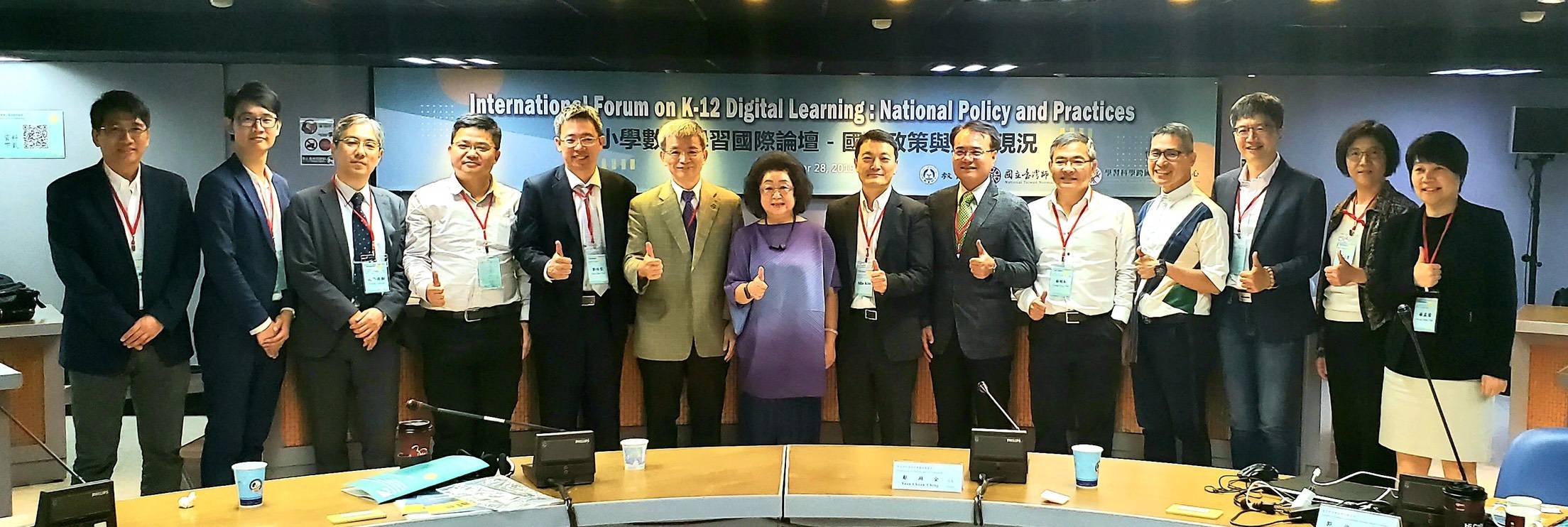International Forum on K-12 Digital Learning – Advancing Digital Learning & International Exchanges Hand in Hand

The International Forum on K-12 Digital Learning: National Policy and Practice jointly organized by the Ministry of Education and National Taiwan Normal University was held on September 28, 2019. Digital learning experts and scholars were invited to Taiwan to address the forum about the digital learning policies of Hong Kong, Korea, Japan, and Singapore and to share details of how these policies are being implemented. Before the forum, the overseas experts visited Danfeng Elementary School in New Taipei City to see firsthand how a school is implementing technology aided autonomous learning, and RenAi Junior High School in Taipei City to observe its use of digital interaction for teaching physics. The visits prompted these experts to strongly endorse Taiwan for its education innovation, digital learning, and AI education related developments and progress.
The idea of holding this forum arose during a study visit to Korea led by Deputy Minister of Education Fan Sun-Lu, in June this year, to learn about digital learning in Korean primary and junior high schools. She observed how Asian countries have responded to the worldwide rapid progress of technology, and Taiwan is similarly proactively promoting ICT education, making good use of emerging technology, and assisting teachers and students to learn in this era of digital technology. This approach is also fully in keeping with the spirit of UNESCO's Education 2030 Framework for Action also called the Incheon Declaration, which calls for ensuring inclusive and equitable quality education, and promoting lifelong learning opportunities for all. This international forum was then organized to give teachers and educators in Taiwan a deeper understanding of other countries' digital learning policies and their experiences actually implementing such policies, and to allow participants to talk and exchange ideas.
During the discussions and exchanges, all the overseas experts consider that teachers play an extremely important role in promoting digital learning and information education, and that resources need to be invested into giving teachers appropriate training. All countries are continuing to use information technology, and at the same time are strengthening their students' autonomous learning skills. Digital learning resource portal websites that are increasingly cloud-based provide support for learning in remote and isolated areas, and innovative teaching. They also provide services such as digital teaching and learning materials for teachers and students, education related information, learning platforms, and teachers' professional learning communities. Forum participants also praised Taiwan's use of AI technology and its development of digital learning platforms, which allow students to be assessed and taught in ways that suit their current ability, and thereby enhance both cognitive diagnosis and effective learning.
The forum demonstrated that Taiwan's digital learning policies are well-aligned with international trends and that the direction Taiwan's digital learning development is taking is for the most part highly consistent with the direction being taken by other countries. They all place emphasis on utilizing digital learning as part of innovating education, and the measures they promote have many similar goals, as well as their own strong points. Continuing to strengthen their engagement in such areas as educational applications of big data and AI, new do-it-yourself technology, reducing the learning gap and the digital gap, and cooperation between public and private sector agencies are all key future tasks for all countries. Forum participants are all aware that the Asian countries promoting digital learning are facing similar problems, and so we should interact and help each other more by joining hands and working together.
